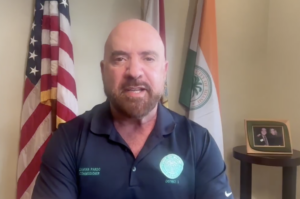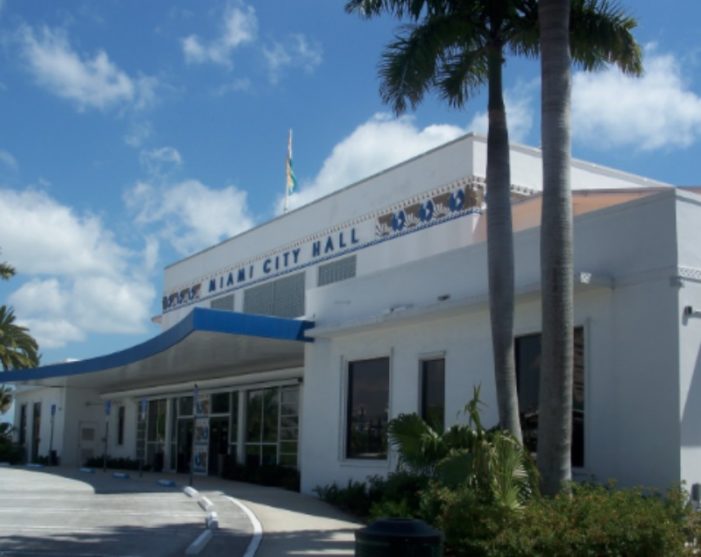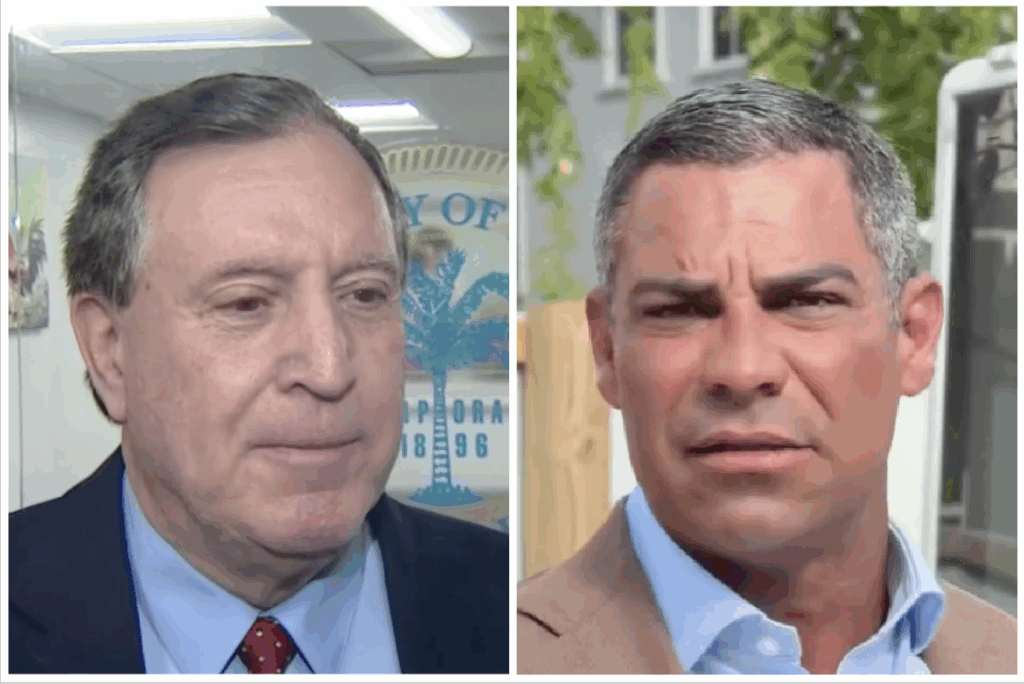Francis Suarez and Joe Carollo want to stick around
In a perfect example of how a good idea can get twisted and turned into an evil plan, the city of Miami Commission is poised to consider a change to the municipal’s biannual election year — from odd to even, to coincide with state and national elections — that would end up extending the terms of all the current electeds by a year.
That means that Mayor Francis Suarez and Commissioner Joe Carollo — who are both facing term limits and are, reportedly, the ones behind this move — will get to stick around until November 2026. Commission Chairwoman Christine King would not have to campaign for re-election until next year.
This idea will be brought to the commission, not this month but at a a later time, by Commissioner Damian Pardo. It is not part of the measure he will bring to next week’s meeting to put lifetime term limits on the ballot, so that, if voters approve, electeds in Miami can’t sit out a term and run for the same seat later.
“These are not things that are tied together,” Pardo told Political Cortadito on Wednesday. “One thing is not contingent on the other.”
But the election year change, when it comes back at a subsequent meeting, is related to the term limits, because there are several candidates already running in this year’s election who would be excluded under the lifetime term limits (i.e. former Commissioner Frank Carollo for his old seat and Joe Carollo for mayor, where he already served from 1996 to 1997 and again from 1998 to 2001. They and the charter amendment would be on the same ballot. And Pardo says he is trying to avoid a legal challenge.
Read related: Voters in Miami may get to strengthen term limits and ban political retreads
“I asked the city attorney what happens if the candidate and ballot initiative pass at the same time,” Pardo told Political Cortadito.  “And he said that may be a challenge that works.”
“And he said that may be a challenge that works.”
“If we move the elections at the same time as we’re making the lifetime term limits, it won’t be clean. It would be challenged,” he said. “So we wait another cycle.”
How about we wait another cycle on the change of the election date? Lifetime term limits are not a bad idea. But it’s not worth keeping Carollo and Suarez around for a year. We’re almost rid of them. Can’t we do this later? After they’re gone?
Pardo also thinks that it’s worth the bitter pill we’d have to swallow to get a higher turnout on Election Day. The difference would be from the 10-15% range to the 65 to 80% range. That would completely stop the Joe Carollos and Alex Diaz de la Portillas of the world from getting elected because there are not enough turkeys at Thanksgiving or pastelitos to buy that many votes. Pardo says it more diplomatically.
“That changes the kind of commission candidate you get,” he said. “You will have to appeal to a different demographic. The entire political landscape in the city of Miami changes. Boom!”
He says it is something that he came up with todo solito, and not because Suarez had threatened to veto his term limits thing unless he did this, too, like las malas lenguas say.
But who would benefit the most? Suarez and Carollo.
Suarez has hinted a possible run for governor in 2026 and could use the bully pulpit and fundraising palanca that the incumbent mayor of the state’s most important city would bring. He may also want another year to solidify his legacy and get projects like the Miami Marine Stadium redevelopment started and Miami Freedom Park closer to finished for the postalita photo opps.
And Carollo just knows he’s not going to win a citywide mayoral race and, thus, has no place else to go. Doral just got a new city manager (more on that later), so going back there is out.
That’s why it looks like City Attorney George Wysong has been researching this. He told the Miami Herald that the City Commission has the authority to move the election back one year all by themselves, without having to go to a referendum. What The Herald story didn’t say was that Wysong is relying on Florida State statutes that are really for “continuity, ease, practicality and efficiency,” said former Commissioner Ken Russell, who has filed to run for mayor.
“They are misusing the statute. It’s an overreach for self serving purposes.”
The commission, Russell says, can’t just wave a magic wand and change the election year.
“By charter, we have odd year voting elections,” Russell said on TikTok, where he is campaigning a lot. He said that a change can be put on the ballot by citizen petition or by a commission vote. “But the voters get to decide.
“There will be an election this year for mayor and there will be a change of leadership.”
He looks like he’s ready to challenge it. There goes Pardo’s reasoning.
Other candidates that may be in the running include Miami-Dade Commissioner Eileen Higgins, former Miami Commissioner  Alex Diaz de la Portilla, and former City Manager Emilio Gonzalez, who also reacted negatively, of course. “This is wrong,” he posted on social media. “This is a blatant power grab.
Alex Diaz de la Portilla, and former City Manager Emilio Gonzalez, who also reacted negatively, of course. “This is wrong,” he posted on social media. “This is a blatant power grab.
“Career politicians want to extend their terms, bypassing voters — in exchange for letting them weigh in on reforms. It’s straight out of the Maduro playbook,” Gonzalez wrote, referring to the Venezuelan dictator Nicolás Maduro. “The voters must decide and no one is talking about them or to them.”
In what must be a sign of the apocalypse, Diaz de la Portilla agreed with Gonzalez and Russell. “Charter does not allow that,” he texted Ladra late Thursday about the ordinance. “It has to go to the people.”
Read related: Petition aims to add Miami commission districts, change election to even years
That is what a citizen-led petition drive announced last month wants to do — take it to the people. Led by Coconut Grove activists Mel Meinhardt and Anthony “Andy” Parrish, the Stronger Miami political action committee aims to change the election date to even years to increase turnout. They have created a coalition with a group of activist organizations and must collect around 26,000 signatures by sometime in the summer to get the question on the November ballot.
They are also petitioning to put two other questions to voters: Extending the commission from five to nine seats and codifying the fair district guidelines that were mandated by a judge.
The change in election cycles could result in the loss of a year instead, which Pardo said he was amenable to. But that seems to disenfranchise the voters who elected them with a four-year term in mind. So, Ladra is not sure she likes that idea, either, unless it becomes effective after their own next election. Cutting the term short would be wrong, unless voters approve it themselves and have fair warning.
And that’s another big reason why this shouldn’t even be considered. Because nobody told voters that terms would be extended for a year, either.
Help Ladra keep them honest. Consider making a contribution to Political Cortadito today and support independent watchdog journalism. There are important elections this year. Thank you.


